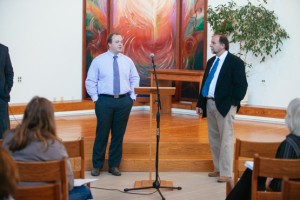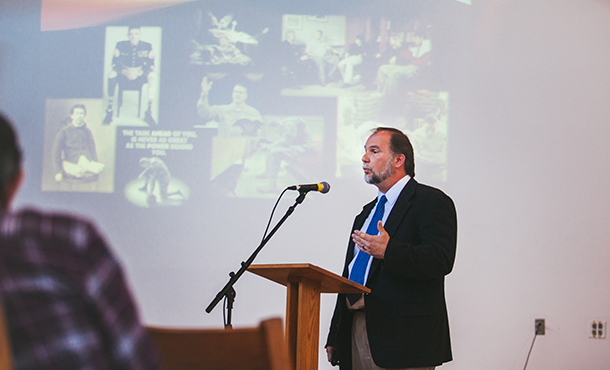A conversation about the needs and issues facing military veterans has been arising in an unexpected place this year: the halls of Eastern Mennonite Seminary (EMS).
The dialogue has grown as several graduate students recently focused their culminating research projects for their Master of Divinity degrees on veterans’ concerns. They include Matt Stearn, who looked at how Mennonite denominations can provide healing communities for combat veterans, and Methodist pastor and former combat veteran Darin Busé, who named spiritual trauma as another casualty of combat.
Though the topic is an unusual area of interest for a seminary in the historic peace church tradition, EMS dean Michael King says the timely and necessary discussion “plunges the seminary into one of the most critical issues of our day. There is a sense of really powerful mutual healing potential.”
[Read an account written by King and Busé, of the healing experienced during foot-washing.]
In recent years, a small stream of veterans or those closely connected to veterans have found their way to both the seminary and to undergraduate programs at EMU. Among them is Michael McAndrew, a U.S. Navy veteran earning dual degrees in conflict transformation and counseling. With a professional interest in serving veterans, McAndrew recently was awarded a scholarship to help finish his studies.

His activism, among other projects, has resulted in visible projects on campus to highlight veterans’ suicides.
Additionally, EMU’s peacebuilding experts have over the years engaged with military communities. For example, “The Journey Home From War” is an adaptation for veterans and military families of Strategies for Trauma Awareness and Resilience (STAR) trainings by counselor Carolyn Yoder ’72.
[Read more from Yoder about common realities veterans face and nine suggestions for support, as well as veteran Mark Lauro’s experience with STAR ].
Such resources are a strength to draw upon, King says, as the seminary and its faculty move to offer support to this ministry.
“At one luncheon, I ended up at a table where everyone was a veteran,” King says. “We had a very good and intense discussion. They said they mostly felt welcomed here, but sometimes they struggled to be sure. At that point, I was increasingly convinced that this ministry was one we could learn more about, as well as support and explore with our students.”
Honoring the ‘veteran presence’ in his life
Matt Stearn certainly thinks so. Stearn grew up in the military-heavy Hampton Roads area of southeastern Virginia. His father was an Air Force veteran, and several family members worked at the Newport News Shipbuilding yards. Later, many of the members of the Baptist church where he worked were veterans.

“I’ve had a lot of veteran presence in my life,” says Stearn, who recently graduated with Master of Divinity and MBA degrees in April. “Having seen some of the ill effects of war and how veterans in some ways distance themselves from church made me want to take a closer look. Something happens to you when you have to take another person’s life. It changes people. How do we as a church respond to that?”
While he was raised in the Episcopal Church and later worked as a musician in Disciples of Christ and Baptist congregations, Stearn currently serves as director of music for Harrisonburg Mennonite Church and “definitely” considers himself a Mennonite. He says he values the anti-war tradition at the heart of Anabaptism, but it doesn’t need to exclude those who have served in the military.
“We really have a theology set up to heal these veterans and provide what they need,” Stearn says. “Mennonites are very good in working with the civilian victims of war, but how can we also recognize soldiers as victims? I think most combat veterans agree that war, by nature, is evil.”
His capstone project, titled “Mennonites and Their Tools: Healing Communities for Combat Veterans,” argued that traditional definitions of and treatments for PTSD miss the trauma of “moral injury,” in which feelings of guilt and shame arise from actions taken during the course of battle. Those actions are often at odds with personal ethics and can create mental and emotional dissonance in the aftermath.
“The various treatments for PTSD don’t treat soul issues,” Stearn says. “They cannot address the moral symptoms of war—only the clinical. Christian moral theology can offer a depth of context that clinical psychology cannot. We must develop a response that is theologically and clinically strong.”
With strength in both of those areas and the reconciliation and peacebuilding expertise of the Center for Justice and Peacebuilding, EMU is particularly well positioned to be an innovator and meet those needs, Stearn adds.
Healing and sharing

Darin Busé, pastor at Mount Zion United Methodist Church, sees similar potential. Busé joined the US Army at age 19, serving six years supporting and engaging in combat in Honduras, Panama, Saudi Arabia and Iraq. Afterward he embarked on a journey as a sous chef, restaurant manager, process engineer and farm manager before realizing a lifelong call to ministry about four years ago, when a friend led him to EMS. He has been a part-time pastor for two years.
On that path, though, his experience on the battlefield—trying to make sense of everything he had seen and done—continued to follow him.
“We experienced moral injury before it had been defined,” Busé says. “We didn’t feel like heroes, but we didn’t want to be villains. Many, many veterans isolated themselves—retreating inward or using alcohol or narcotics—and some acted out violently.”
The suicide rate, currently about two dozen a day according to recent statistics, is historically high among veterans. Busé says those figures may underestimate the problem.
“It’s tragic,” he says. “It’s unacceptable.”
He found a safe space to deal with his past at EMS, healing himself even as he sought to become one who could bring healing. In his first-year formation class, many of his experiences came up in the sharing, and the group would “unpack” it together.
“It became clear that I had been trying to make rational, things that were irrational,” Busé says. “It took framing things in a spiritual context for me to start bringing some order to what I had experienced, but it’s a lifelong process, and community is a huge part of that process. It takes a community that will listen and accept the brokenness and not judge you based on your mistakes.”
His capstone project, titled “Human Wholeness and the Dissociative Effects of Post-Combat Trauma,” looked at some of those issues, naming spiritual trauma as another casualty of combat and pondering how one goes from “transgression to transformation.” Sharing the Good News, being open to veterans’ needs, and listening and offering friendship are ways that congregations can provide the necessary community and spiritual context that may lead to healing.
Self-identifying as a veteran at EMU brought some challenges, Busé says, but also many blessings. He found that Mennonites have “an embedded language, a vocabulary, of peace and justice and reconciliation that other churches haven’t really teased out.”
“You navigate through the challenges, utilize the resources and try to keep opening up appropriate spaces for conversation,” he says. “I needed to find healing. EMS has done that for me, so I want to share that with others.”
Hear a podcast of Matt Stearn’s presentation and Darin Busé’s presentation.
